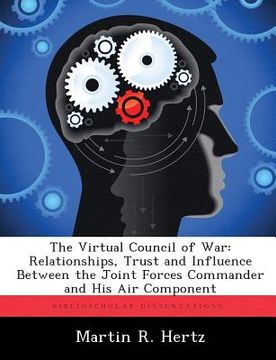Share
The Virtual Council of War: Relationships, Trust and Influence Between the Joint Forces Commander and His Air Component (in English)
Martin R. Hertz
(Author)
·
Biblioscholar
· Paperback
The Virtual Council of War: Relationships, Trust and Influence Between the Joint Forces Commander and His Air Component (in English) - Hertz, Martin R.
$ 48.80
$ 57.95
You save: $ 9.15
Choose the list to add your product or create one New List
✓ Product added successfully to the Wishlist.
Go to My WishlistsIt will be shipped from our warehouse between
Monday, July 15 and
Tuesday, July 16.
You will receive it anywhere in United States between 1 and 3 business days after shipment.
Synopsis "The Virtual Council of War: Relationships, Trust and Influence Between the Joint Forces Commander and His Air Component (in English)"
This study addresses the problem of geographically separated commanders, the impact of separation and the affect of electronic meeting systems on their relationship. The author examines the problems to building relationships, establishing trust and gaining influence caused by geographically separated headquarters linked with tele-visual communications. The paper identifies two proposals to the Air Force deployed command structure resulting in separated but electronically connected commanders: Global JFACC and Standing Core Joint Forces Headquarters. Next, the paper examines the effects of organizations that depend upon electronic meeting systems to bind its geographically separated parts, focusing on the ability to communicate and problem solve. It then examines the historical relationships between three pairs of commanders to examine the correlation between personal relationships and effectively employed airpower. The paper concludes that airpower solutions require an air component commander (JFACC) who can influence the Joint Forces Commander (JFC) in order for those solutions to be employed. To do this, the JFC and his JFACC should build a relationship face-to-face. The JFACC must then earn the JFC's trust by effectively employing airpower towards the JFC's goals. Co-locating headquarters may be the best way to build such a relationship, but circumstances may dictate separation. In those instances, participants should be aware of pitfalls, strive to conduct as many face-to-face meetings as possible, and use electronic meeting systems with the most social presence possible.
- 0% (0)
- 0% (0)
- 0% (0)
- 0% (0)
- 0% (0)
All books in our catalog are Original.
The book is written in English.
The binding of this edition is Paperback.
✓ Producto agregado correctamente al carro, Ir a Pagar.

